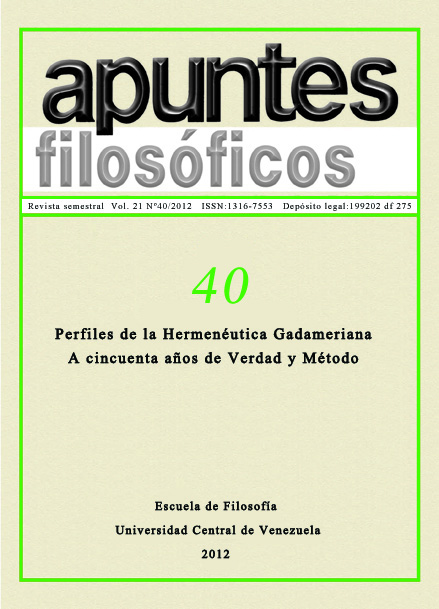Gadamer y la igualdad sustancial de pensamiento y lenguaje en San Agustín
Palabras clave:
hermenéutica, ontología, lenguaje, substancia, verbo interior, memoria dei, consubstancialidad, encarnación, noticia, Hermeneutics, Ontology, Language, Substance Internal Verb, Memory Dei, Consubstantiality, Incarnation, NewsResumen
En uno de los últimos capítulos de su obra Verdad y Método, Gadamer realiza una “acuñación del concepto de lenguaje a lo largo de la historia del pensamiento occidental”, y al llegar a la Edad Media, sorprende con la consideración del tema teológico de la ‘encarnación del Verbo’ para explicar la relación entre pensamiento y lenguaje. No obstante, este recurso le permite elaborar una argumentación en apoyo a su teoría ontológico-hermenéutica del lenguaje. La analogía entre el tema teológico y el modo de ser del lenguaje, ya la pensó San Agustín y la registró en su libro De Trinitate. Ahí explica la naturaleza sustancial del verbo interior, y el modo particular en que éste sigue el proceso que conduce a su encarnación en vox, sin perderse o transformarse en mero signo convencional. En virtud de la relación que el verbo interior guarda con las notitias, con las Ideas en el Verbo, y con las esencias de las cosas físicas de este mundo, se logra una interesante y coherente ontologización del lenguaje, que servirá de inspiración a Gadamer.
Gadamer and the substantial equality of thought and language in St. Augustine.
Abstract
In one of the last chapters of his book Truth and Method, Gadamer does a "coining of the concept of language throughout the history of Western thought", and when reaching the study of the Middle Ages, he surprises his readers by considering the theological issue of the 'incarnation of the Verb" to explain the relationship between thought and language. However, this resource allows him to develop an argument in support of his ontological- hermeneutical theory of language. The analogy between theological theme and mode of being of language was already thought by Saint Augustine and recorded in his book On the Trinity. There he elaborates on the substantial nature of the inside or internal verb, and the particular way in which it undergoes the process that leads to its incarnation into vox, neither getting lost nor becoming a mere conventional sign. By ways of the connection between the interior verb with notitias, with the ideas in the Verb, and with the essence of physical things in this world, an interesting and coherent ontologization of language it achieved, which would later inspire Gadamer.

